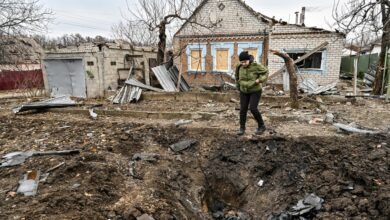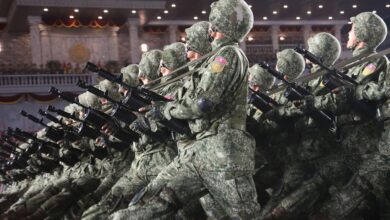Germany is ready to take a leading role in ensuring Europe’s security, Chancellor Olaf Scholz said Friday, vowing to transform the country’s military into the “best equipped” on the continent.
Branding Vladimir Putin‘s Russia the “biggest threat” to NATO, Scholz said Europe had to be prepared to face up to the challenge.
“We are making it convincingly clear: Germany is ready to take on leading responsibility for the security of our continent,” he told an army congress.
“As the most populous country with the greatest economic power and as a country in the middle of the continent, our army must become the cornerstone of conventional defence in Europe, the best equipped force in Europe.”
Haunted by two world wars, Germany has always trod lightly and quietly on the world stage when it came to conflicts and military matters.
Scholz said the German army had for too long taken on roles such as “drilling wells, ensuring humanitarian help, stemming floods, also helping with vaccinations during the pandemic.”
“But that is not your core mission,” he said. “The core task of the Bundeswehr is the defence of freedom in Europe.”
Russia’s invasion of Ukraine has prompted Scholz’s government to tear up long-held defense and foreign policies.
Acknowledging that the “capability gaps” of the army are “large,” Scholz vowed to plug them rapidly.
Days after Russian soldiers marched into Ukraine, Scholz announced a 100-billion-euro ($100-billion) fund to beef up Germany’s military defenses and offset decades of chronic underfunding.
‘More or Less Bare’
The special fund for the Bundeswehr has since been written into the German constitution.
Europe’s biggest economy will also raise military spending to two percent of GDP after years of underinvestment that irked NATO partners.
Plagued by years of financial neglect, the chief of the German land army, Alfons Mais, laid bare the morose state of the Bundeswehr on the day that Putin ordered his troops into Ukraine.
Mais underlined that the army’s “options” to back up NATO were “extremely limited.” The Bundeswehr “is more or less bare,” he said.
Since the end of the Cold War, Germany has reduced its troop strength from 500,000 at the time of reunification in 1990 to about 200,000 today.
Defense officials have repeatedly sounded the alarm over the army’s equipment woes — a litany of disrepair plaguing fighter planes, tanks, helicopters, and ships.
With Germany, like other Western allies, under pressure to send armaments to bolster Ukraine, the state of its army stocks also became clear.
Despite a thriving armaments industry, weapons that Germany has promised to Ukraine include items, such as the Iris-T air defense systems, that even its own army did not possess.
Germany’s top defense chief Eberhard Zorn this week warned that the German military had to be careful its own stocks did not run low as it rushed to supply Ukraine.
“Everything we give away, we need back,” he warned.












